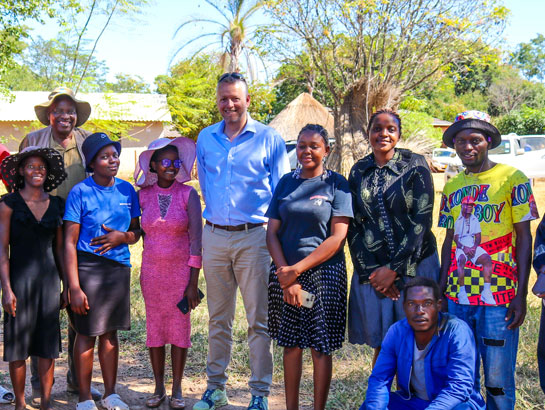In Bindura, Zimbabwe, a group of young people from the Plymouth Youth Group is making waves with their inspiring journey. They have tackled poverty head-on by growing biofortified Jasmine beans, turning barren land into a symbol of hope. In the words of one young farmer, “seeds of change were sown in barren fields.”
Guided by a shared vision of empowerment and resilience, these youths have overcome challenges with support from HarvestPlus through the “Scaling Nutrition Resilience in Zimbabwe” project funded by Happel Foundation. This initiative aims to boost access to biofortified iron beans, iron cowpeas, iron pearl millet, vitamin A maize, and vitamin A sweet potatoes—enhancing the health and livelihoods of approximately half a million people in Zimbabwe.
Partnership with HarvestPlus has been a game-changer for Plymouth Youth Group. This partnership not only provided agronomic training and knowledge on biofortification to the group, but also linked them to the commercial market. HarvestPlus connected the group to African Preserves— a baked beans processing company—which supplied them with the initial biofortified Jasmine beans seed for planting and promised to buy the produce once harvested. This connection is turning their hard work into a successful market venture.
Samantha Chaderera, one of the young farmers, shared her excitement: “HarvestPlus did not just give us farming tips and biofortification knowledge—they helped us find a buyer in the market. Thanks to their support, our hard work in the fields is set to pay off with a promising harvest and a ready market.”
Despite hurdles like a lack of equipment and unexpected winter frost during their first planting season, the Plymouth Youth Group carried on. They managed to plant four hectares of Jasmine beans and are now expecting to harvest over two tons. Lawrence Mjere, the HarvestPlus agronomist, praised their efforts: “These youths have shown incredible perseverance. Their dedication to planting and harvesting Jasmine beans, despite setbacks, is a testament to their hard work and resilience.”
Their impact extends beyond the fields. The Plymouth Youth Group’s success has inspired others in their community, steering them away from potential pitfalls like drug abuse and toward more hopeful futures. Marvelous Chirume, another young farmer, reflects, “Our commitment to growing these biofortified crops has given us a purpose and kept us focused on positive goals. We are not just working the land; we are setting an example for others.”
As they wrap up their first season, the Plymouth Youth Group is already looking ahead. They plan to expand their project, cultivate more land, and explore new markets for their biofortified crops. They are also considering adding new varieties to their crops, like vitamin A maize and iron cowpeas, to further their mission of combating hidden hunger.
Takunda Jakopo, a member of the group, sums it up, “We are excited about the future. Our goal is to grow our farming project, explore new markets, and diversify our crops. By including more nutrient-rich varieties, we hope to make an even bigger impact in our community and address hidden hunger.”
